Since April of this year, I’ve had a blog article on DiscoverSkills.com about the Facebook Timeline that’s been getting a lot of Google search traffic. (CLICK HERE if you’d like to read it).
 In the last 28 days alone, over 11,000 visitors have read the article, and even for the past week it’s still been averaging about 500 hits a day.
In the last 28 days alone, over 11,000 visitors have read the article, and even for the past week it’s still been averaging about 500 hits a day.
It’s great to have an article noticed and read, but there’s also a side benefit that’s kind of fun.
Each time someone pulls up the site page, a tracking service I use collects information about that person.
No, I don’t get any PRIVATE information like name, address, or phone number, but I do get information about the technology they are using to view the page.
And that’s the part that’s kind of fun. The captured statistics give me a chance to see a snapshot of what folks are currently using for their web-based technology.
Is this information useful? To some degree, yes it is, especially as I work on the design of the DiscoverSkills site. Knowing how people are viewing pages helps me make sure the site is properly formatted (page width, graphic size, etc.) so that folks can best see things.
But as I was looking through the numbers this morning, it dawned on me that perhaps you guys… my site visitors and computer students… might get some benefit from seeing what OTHERS are using for accessing the web.
Now, please understand that I’m not showing you these numbers to influence you to change your technology habits to what the majority of OTHERS are doing. I’m showing them so that you can get some perspective of how “what you are doing” fits into the bigger scheme of things.
So here we go…
In the following sections you’ll see what the 11,063 site visitors to DiscoverSkills were using for technology, for the time period of July 18th to August 14th, 2012.
NOTE: Please understand that when I break out the numbers for you, things are not always going to add up. In most cases I’m showing you only the top numbers for browsers or screen resolution, and leaving off technologies that had low numbers.
Windows Versions vs. the Mac Operating System
As you probably know, your computer operating system refers to Windows (on the PC) or OS-X (on the Mac). Not only can I see which operating system you are using to visit the site, but I can see the “version” as well.
Here’s how it breaks down for that 28 day period.
It’s always interesting to see how the PC versus Mac battle is going, but I think it’s more interesting to see (1) That Windows 7 is the well-established leader in Windows versions, (2) That Windows XP is still hanging in there, but loosing ground, and (3) that 18% of my visitors were using Mobile devices.
And did you see that 18 folks were using one of the beta copies of Windows 8 (since it won’t be officially released until later this year)?
Browser Wars
Next, let’s take a look at what browsers folks were using.
As you can see, the once powerful and almighty Microsoft Internet Explorer (the browser that stomped good old Netscape out of existence) has been overtaken by not just ONE competitor, but two. Both Google Chrome and Mozilla Firefox are ahead of IE by a comfortable margin.
I think that part of the reason that a lot of folks have switched to Chrome (my personal favorite) and Firefox is because of the advice given by security experts who tell you that using Internet Explorer leaves you open to more malware attacks, because that’s the program that most hackers target.
But as you might guess, with IE loosing ground, those same hackers are now also targeting Chrome and Firefox… so that advantage is dissapearing.
Still, when you compare the “browsing experience” between Chrome, Firefox, Explorer, Safari, and even Opera, you’ll find that one browser in particular may “feel better” than the rest.
And that’s the approach I think you should take. Try them all and then pick your favorite.
And yes, you CAN have them all on your computer at the same time, and they will peacfully coexist.
BTW, at the Computer Education Center lab in Lincoln, we actually have a class called “Browser Wars” where we take you through the different browsers so that you CAN compare them. CLICK HERE to check our class schedule and see when the next one is offered.
Screen Resolution
Screen resolution refers to how wide and tall your monitor display is in pixels (which is NOT the same as the “size of your monitor” in inches).
Most operating systems, like Windows, let you easily change the resolution whenever you want to.
Why change it? Well, changing the resolution UPWARD (displaying MORE pixels) let’s you “see more” on a page. Changing the resolution DOWNWARD (less pixels) makes everything on the screen “bigger”.
The point is, you’ll want to change the resolution to whatever setting lets you see things the best.
BTW, I have a video tutorial on how to change the screen resolution. CLICK HERE to see it.
Anyway, here are the site visitor statistics for resolution:
Not a lot to comment on here except to point out that the days of 800 x 600 are pretty much gone, especially now that most home computer users have flat-panel monitors that lend themselves to higher resolutions.
Where Are They From?
The final statistic I’m going to share won’t make any difference to you personally (like the others might), but it’s kind of fun to see.
There were quite a few other countries, such as China and Hong Kong listed, but all were less than “50” so I left them off this graphic. Still, the point is, you never want to forget that the Internet is a “world-wide” phenomena that includes a wide range of cultures and view points.
So there you have it. A non-scientific survey of what folks are using for technology on the Internet. I hope you found it as much fun as I did to look through.
As always, I’d love to hear your experiences or comments. You can leave them below…


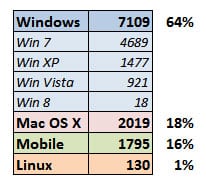
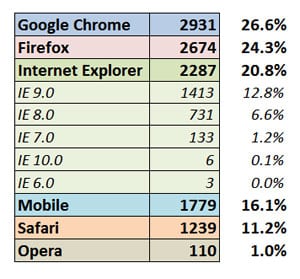
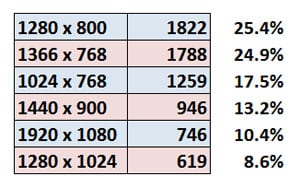
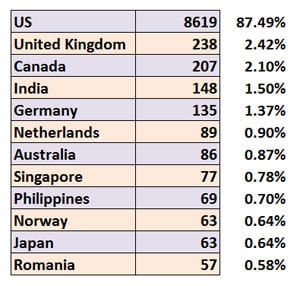







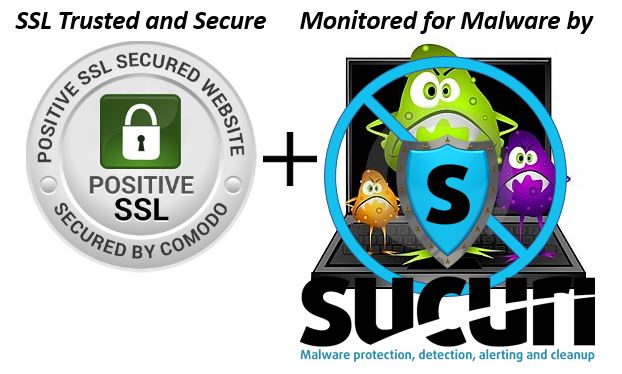
This article was interesting. I currently have an older computer with Windows XP, so I am not up to date. It is slowly wearing out (it’s about 7yrs old). Hopefully I will be able to afford a new one. When the time comes, maybe I will ask your opinion on one that would be best for me.
Keep the articles coming.
Hi Carol…
I’m certainly happy to help when it comes to picking out a new computer, although I’m also a believer in “if it’s doing what I need to do… why spend the money!!!”.
But when you do start looking, just drop me a note with specific computers you might be interested in, and I’m happy to explain all the geeky “tech” stuff.
Thanks for posting!!!
John Lortz
John; Nice to get news of this kind, i love it and i try very hard to keep up on all things connected to the computer even though they don’t seem relevant at the time. I will be getting windows 8 just as i got 7, scared of falling behind i guess, and thanks again. Your friend Harold
Hi Harold…
So… you’re going to be on the “bleeding edge” with Windows 8, eh? Well SOMEONE has to be!!! 🙂
Of course, I’ll be interested in hearing how things go with it. Since I’m in the business of teaching this stuff, I’ll have to make the leap too. But I still plan on leaving all my “production” computers at Windows 7 for now. We’ll just test Windows 8 on a spare machine.
As always, thanks for posting!
John Lortz
Interesting statistics. Am using Windows 7. I like it better then Vista. I recently started using Google Chrome but like plain old Google better but have not figured out how to get it back. I use 1280 x1024 resolution. That is what my computer recommends. Thanks for the stats.
Hi Yolanda…
I’m with you that Windows 7 is a better ‘windows’ than Vista. I would personally have to say that it’s the most stable version of Windows yet, and is probably my favorite.
As for Google Chrome, I too use it on a daily basis. One note, however… when you say you like “plain old Google better”… I’m wondering if you mean that you use to have Google (the site) as you Home page, and now with Google Chrome (the browser) you don’t. You can always change your home page in Google Chrome by going into the “gear” button at the upper right corner of the screen, and choosing SETTINGS from the menu.
Anyway, thanks much for the post!
John Lortz
That was interesting that Google Chrome was the most popular browser since it is what I use with I-Google, however I can’t print coupons with it. It keeps asking for a program I already have and even if I download it again it doesn’t recognize the software. Any suggestions?
Hi John…
Which program does it ask you for when you attempt to print? Are the coupons perhaps in PDF format? If so… an alternative would be to RIGHT click the link to the coupon and choose SAVE TARGET AS from the menu. This would allow you to save the coupons as a PDF file on your local computer. You could then just open the PDF file with the Adobe Reader software (which is probably already on your computer), and print from there… instead of from the inside of Chrome.
Sometimes in browsers, the Adobe Reader plugin (which lets you open PDF files directly in the browser) gets messed up and doesn’t work right. I’ve had this happen in ALL my browsers at one time or another. As I mentioned above, when that happens I just save the PDF as a file and open it directly.
Thanks for the post!
John Lortz
Hi John, I have just started using Chrome, as one of my websites (billiongraves.com) wouldn’t work well with explorer and they suggested Chrome. Explorer is still my default and if I can use Chrome enough, I will switch. But now my Chrome sites will not close out. I have to go to CNTL ALT DELETE and end task. Any comments. Sandy
Hi Sandy…
When you say that Chrome won’t close, do you click the X button at the upper right corner, Chrome just continues to stay on the screen? Another thing to try is to RIGHT click the Chrome button on the Taskbar and choose CLOSE WINDOW. You may have to do it more than once, but it sometimes works.
Thanks!!!
John Lortz